Pioneers
7. Networks
7.5. Moustafa Amin Youssef

Figure 1: Moustafa Amin Youssef
Source: American University in Cairo (no date)
Downloadable teaching resource
Overview
Professor Moustafa Youssef is a leading specialist in wireless networks and location-based systems at the American University in Cairo. A Fellow of both IEEE and ACM, he founded the university’s Wireless Research Center and developed technologies such as Horus, Dejavu, and CrowdInside, which have shaped the field of indoor localisation and energy-efficient tracking (Youssef and Agrawala, 2008; Abdelnasser, Youssef and Harras, 2015; Alzantot and Youssef, 2012).
Background
Born in Alexandria in 1975, Youssef earned his BSc and MSc from Alexandria University before completing his PhD in Computer Science at the University of Maryland in 2004. His thesis introduced the Horus WLAN location system, one of the earliest probabilistic Wi-Fi-based tracking frameworks (Youssef and Agrawala, 2008). He later returned to Egypt, where in 2010 he established and directed AUC’s Wireless Research Center.
Contributions
Professor Moustafa Youssef has advanced the field of indoor localisation and wireless sensing through a series of innovative systems. His early work on Horus introduced a probabilistic Wi-Fi tracking method that achieved sub-meter accuracy - laying the groundwork for future location-based technologies (Youssef and Agrawala, 2008). He later developed device-free localisation, enabling passive detection of human presence without requiring wearable sensors, a major leap for ambient intelligence applications (Youssef, Mah and Agrawala, 2007).

Figure 2: Moustafa Amin Youssef
The African Academy of Sciences (2025)
In 2012, Youssef launched CrowdInside, a system that automatically generates indoor maps using crowdsourced smartphone data - earning the 2013 COMESA Innovation Award (Alzantot and Youssef, 2012). His follow-up project, Dejavu, offered an energy-efficient GPS alternative by using cell towers and Wi-Fi signals, winning Best Paper at ACM SIGSPATIAL GIS in 2013 (ACM, 2020). Most notably, Youssef led the development of WiGest, a gesture-recognition system that converts ambient Wi-Fi fluctuations into precise user commands - demonstrating the potential for touchless interfaces using existing infrastructure (Abdelnasser, Youssef and Harras, 2015).
Feature: WiGest – Harnessing Wi-Fi for Ubiquitous Gesture Recognition
WiGest is a pioneering gesture-recognition system developed by Professor Moustafa Youssef and his collaborators to enable hands-free control of mobile devices using ambient Wi-Fi signals. Unlike traditional systems that rely on cameras, wearables, or infrared sensors, WiGest works with standard Wi-Fi hardware, requiring no modifications, calibration, or training (Abdelnasser, Youssef and Harras, 2015).
The system detects subtle hand movements - such as rising, falling, and pausing - by analysing fluctuations in signal strength. These movements are translated into gesture primitives, which are then mapped to application actions like play, pause, or volume control. WiGest introduces a gesture preamble to reduce false positives, making it robust even in noisy environments or when other people are nearby.
In real-world tests, WiGest achieved up to 96% accuracy using three access points and remained effective through walls and in non-line-of-sight scenarios. Its energy-efficient design and compatibility with off-the-shelf devices make it a scalable solution for ubiquitous computing. WiGest exemplifies Youssef’s vision of sensor-less, context-aware interaction, pushing the boundaries of human-computer interfaces in everyday environments.
Watch: Revolutionising Location Tech – Moustafa Youssef
Video 1: Prof. Moustafa Youssef explains how his team developed energy-efficient outdoor alternatives to GPS and pioneered indoor location technologies using smartphone sensors and Wi-Fi signals.
Transcript
We’ve been working in location tracking systems for maybe 25 years till now, and our group is considered one of the top worldwide in location tracking.
As we know, GPS is one of the most commonly used techniques for location tracking worldwide. However, GPS has two main shortcomings.
First, it’s an energy-hungry technique—meaning that if you leave the GPS running on your phone, it will drain your battery quickly. The other thing is that it doesn’t work indoors. So my research tries to address these two aspects of GPS shortcomings—providing alternative techniques that are more energy efficient and that work outdoors, as well as developing indoor location tracking technologies where GPS doesn’t work.
Deja Vu: So for the first point—alternatives to GPS that are more energy efficient—we proposed a system called Deja Vu, which uses the sensors on your phone. The idea is to use what we call virtual landmarks in the environment.
For example, if you are in a car, driving, and your car makes a U-turn, most probably you are in the left-most lane—because you typically make a U-turn from the left-most lane. Your phone has an accelerometer that measures acceleration. When you make the U-turn, it affects the acceleration sensor, and by detecting that motion, I can estimate your current location.
So by combining all these virtual landmarks, we can create an energy-efficient solution that is an alternative to GPS, with comparable accuracy. This research won the Best Paper Award at ACM SIGSPATIAL 2013, one of the most prestigious conferences worldwide.
For the second contribution—indoor tracking technologies—we’ve developed various techniques over the years that use Wi-Fi signals, cellular signals, and inertial sensors on the phone to obtain location accuracy of less than one meter. These systems also work indoors and don’t consume significant energy.
AUC helps in my research not just by providing infrastructure and resources, but most importantly through its human capital—the brilliant students. The students at AUC are eager to learn, compete, and build their futures. I think this is one of our greatest assets to build on.
Moustafa Youssef, professor in the Department of Computer Science and Engineering, has made considerable strides in his research on employing mobile devices for location tracking technology - gaining recognition from top educational and scientific institutions, as well as major tech companies.
See also
ResearchGate Profile – Collaborations and full-text access to selected papers.
Google Scholar Profile – Citation metrics and publication list.
References and further reading
Abdelnasser, H., Youssef, M. and Harras, K.A. (2015) 'WiGest: A ubiquitous WiFi-based gesture recognition system'. IEEE INFOCOM. Available at: https://arxiv.org/pdf/1501.04301 (Accessed: 19 July 2025)
ACM (2020) People of ACM – Moustafa Youssef. Available at: https://www.acm.org/articles/people-of-acm/2020/moustafa-youssef (Accessed: 19 July 2025)
Alzantot, M. and Youssef, M. (2012) 'CrowdInside: Automatic construction of indoor floorplans'. ACM SIGSPATIAL GIS. Available at: https://arxiv.org/abs/1209.3794 (Accessed: 18 August 2025)
American University in Cairo (no date) Moustafa Amin Youssef – Faculty Profile, Department of Computer Science and Engineering. Available at: https://www.aucegypt.edu/fac/moustafa-youssef (Accessed: 11 July 2025)
AUC Egypt Media Release (2021) AUC Professor Moustafa Youssef: First and Only ACM Fellow in the Middle East and Africa. Available at: https://www.aucegypt.edu/media/media-releases/auc-professor-moustafa-youssef-first-and-only-acm-fellow-middle-east-and (Accessed: 11 July 2025)
Google Scholar (no date) Moustafa Youssef – Citations. Available at: https://scholar.google.com/citations?hl=en&user=r6DUyxsAAAAJ (Accessed: 19 July 2025)
ResearchGate (no date) Moustafa Youssef – Publications and Scientific Contributions. Available at: https://www.researchgate.net/profile/Moustafa-Youssef-2 (Accessed: 19 July 2025)
The African Academy of Sciences (2025) Moustafa Youssef. Available at: https://aasciences.africa/fellows/moustafa-youssef (Accessed: 06 September 2025)
Youssef, M. (2022) Research in Location Detection Technology Hailed Globally, YouTube video, 18 February. Available at: https://www.youtube.com/watch?v=-0tbxYaEAhs (Accessed: 30 July 2025)
Youssef, M. and Agrawala, A. (2008) 'The Horus location determination system'. Wireless Networks, 14(3), pp. 357–374. Available at: https://link.springer.com/article/10.1007/s11276-006-0725-7 (Accessed: 19 July 2025)
Youssef, M., Mah, M. and Agrawala, A. (2007) 'Challenges: Device-free passive localization for wireless environments'. ACM MobiCom. Available at: https://dl.acm.org/doi/10.1145/1287853.1287880 (Accessed: 19 July 2025)
